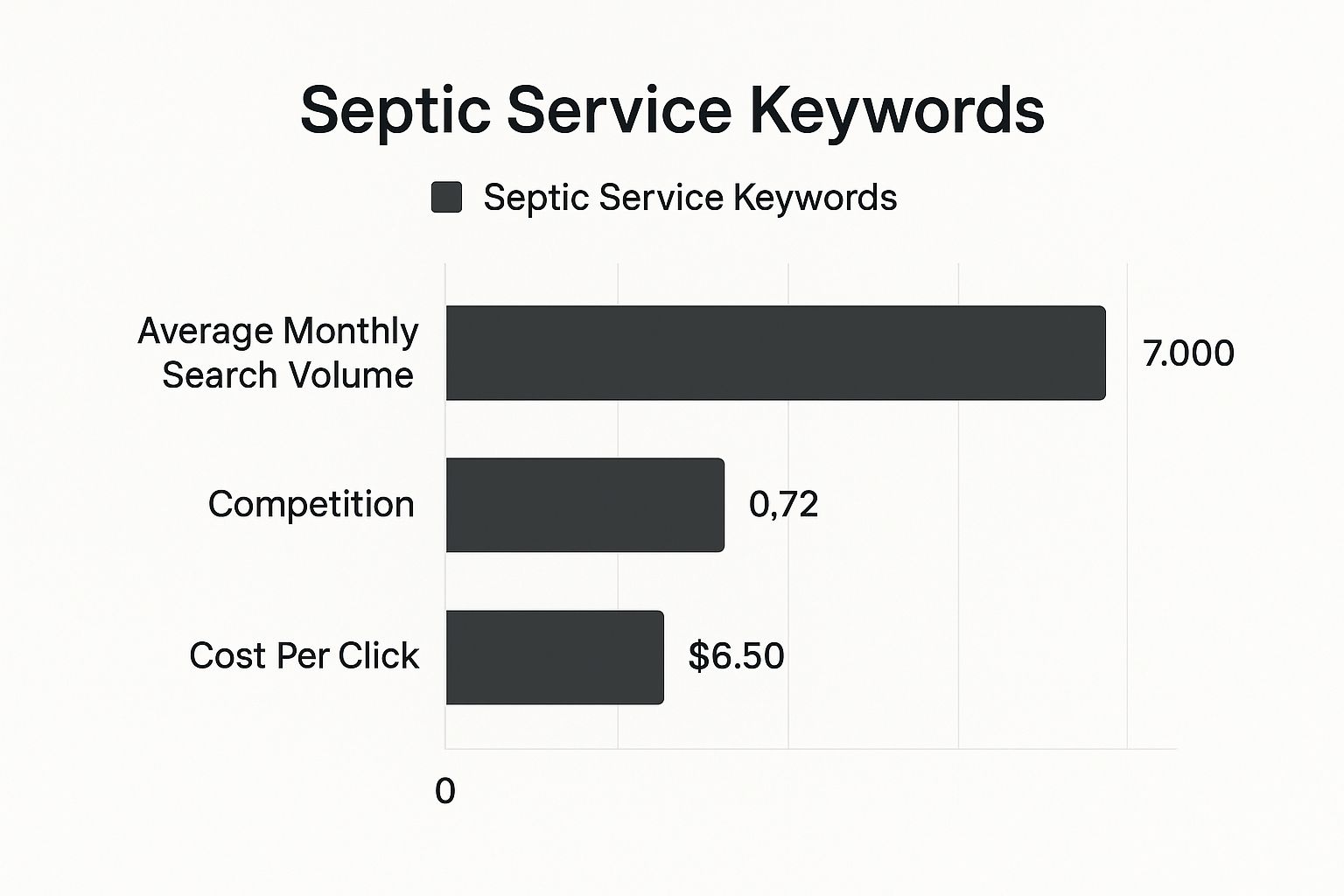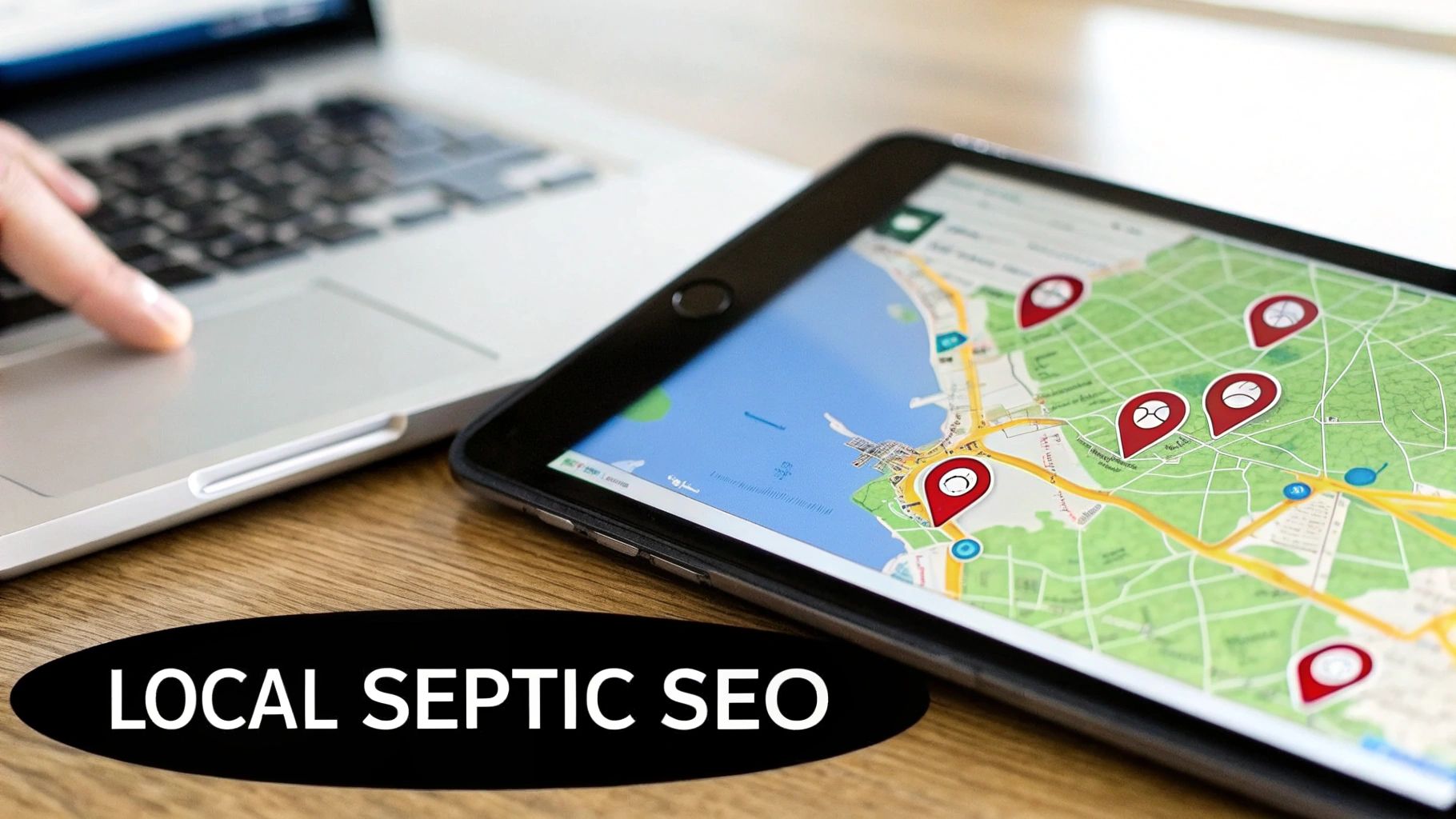You're in the business of pumping tanks, not tinkering with websites. But here's the deal: Septic SEO is the most direct way to get more service calls.
When a homeowner has a septic disaster, they aren't looking in the phone book. They're grabbing their phone to search for help, right now.
If your septic company isn't at the top of the search results, you're invisible. This guide breaks down how to change that.
In Short: Septic SEO helps local customers find your business online the moment they need septic services, turning their emergency searches into your jobs.
Why Your Septic Business Needs Local SEO
Picture this: a septic alarm is blaring. The homeowner's first move is a frantic Google search for "emergency septic pumping near me."
If your business doesn't show up, you don't exist in that critical moment. SEO isn't just a nice-to-have; it's essential for staying competitive.
It's about being the first name a local customer sees. Your competitors are likely using these strategies, getting leads that should be yours. A solid local SEO plan is how you dominate your service area.
Here’s what it looks like when you show up for that panicked homeowner.

The companies in that "map pack" get the first calls. They turn a homeowner’s crisis into their next paying job.
Tapping Into a Growing Market
The need for reliable septic services is growing. The market was valued at $6.72 billion in 2025 and is projected to hit $11.3 billion by 2032.
A smart SEO strategy helps you get your piece of that growing pie. It creates a steady stream of quality leads. You won't have to rely on old-school ads that don't work anymore.
If you're new to this, it helps to understand the basics. For a great starting point, check out a comprehensive guide to SEO for beginners.
In Short: Septic SEO puts your business in front of local customers when they need you most, creating a reliable stream of income.
Finding Keywords Your Customers Actually Use
Good septic SEO is about thinking like your customer. Forget the technical jargon for a moment. Put yourself in the shoes of a homeowner with a problem.
They aren't Googling "non-hazardous liquid waste solutions." They're typing "septic tank backing up into house" or "septic alarm going off what to do."
Your job is to meet them with the exact words they're using.
A simple way to start is on Google. Type a service like "septic pumping" into the search bar. The autocomplete suggestions are what real people are searching for.
What Makes a Keyword a Good Keyword?
A good keyword shows "intent to hire." It screams, "I need someone now!"
Think about it. The person searching "how a septic system works" is just researching. But someone searching "emergency septic repair in [Your Town]" is a customer ready to pay.
These are the keywords that grow your business.
Pro Tip: The best keywords combine an action ("repair," "pump"), a location ("near me" or your city), and urgency ("emergency," "24-hour").
This is where you gain an edge over your competition.

Sometimes keywords with lower search volume are your best bet. They are less competitive, so you can rank for them faster and capture motivated customers.
Sorting Keywords by Customer Intent
Group your keywords by the customer’s mindset. This helps you build a website that has the right answers for everyone.
- Blog posts are great for people researching a problem.
- Service pages need to target people ready to book a job today.
Here’s a simple way to organize your keyword list.
Septic Service Keyword Examples by Customer Intent
| Customer Intent | Keyword Type | Example Keyword |
|---|---|---|
| Informational | They're looking for answers. | "how often to pump septic tank" |
| Commercial | They're comparing options. | "best septic companies near me" |
| Transactional | They're ready to hire. Now. | "septic pumping [Your City] same day" |
| Navigational | They're looking for you. | "[Your Company Name] phone number" |
When you build your list this way, you create a strategic map for your website. You'll guide customers from their first Google search all the way to calling your number.
Getting Your Website Ready for Local Customers
Think of your website as your best employee. It works 24/7 to bring you business.
When a homeowner with an emergency lands on your site, you have seconds to convince them you're the right choice. They need to know what you do, where you do it, and how to reach you.
This is where on-page septic SEO turns your site into a lead-generating machine. Let's focus on your most important pages: your homepage and your service pages (pumping, repair, installation).
Make It Obvious You’re the Solution
No one reads a novel when their drain is backing up. Vague descriptions won't work. Customers need to see their exact problem on your page.
Here’s a quick checklist for every service page:
- Page Title: Include the service and your city. Example: "Emergency Septic Pumping in Springfield."
- Main Heading (H1): This should match the page title. Keep it clear and simple.
- Service Description: Explain the service. Use related terms like "septic tank cleanout" or "waste removal" to give Google more context.
- Phone Number: Put your phone number at the top, big and bold. Make it a clickable tap-to-call button.
This simple setup helps both Google and your customers understand what each page is about.
Pro Tip: Create a separate page for every service you offer. This lets you target specific keywords and increases your chances of ranking for each job type.
The septic industry is growing more competitive. The U.S. septic cleaning market is set to hit $7.0 billion by 2025. To keep up, explore key trends and innovations on SepticTrucks.com. This is especially true for contractors, and you can dive deeper with this guide on SEO for contractors.
Structure Your Pages for Clarity
Google wants helpful content that’s easy for humans to understand. A clear page structure is a big part of that.
Look at this screenshot from Google's own SEO guide. It highlights the value of descriptive page titles.

A vague title gets you nowhere. A specific one tells everyone what to expect. This simple change helps search engines and customers grasp your content, making them more likely to call you.
Dominating the Map with Your Google Business Profile
For a septic business, your Google Business Profile (GBP) is often more important than your website. It's the first thing people see when they search "emergency septic pumping near me."
That's the Google Map Pack. It’s your digital storefront. A well-managed GBP gets you listed there.
A solid septic SEO plan starts with a strong GBP. This isn't a one-time task. You have to treat it like a living part of your business.
Nail the Basics First
Inconsistency is your worst enemy. Google needs to see the same information everywhere to trust you.
- Business Name: Use your real business name. Don't stuff it with keywords like "Springfield's Best Septic." Google will penalize you for that.
- Address: Use a real, physical address. If you're a service area business, you can hide your street address.
- Phone Number: List your main business line. Make sure it's the same number used everywhere online.
- Website: Link to your homepage.
Getting these details wrong undermines all your other efforts.
Choosing the Right Categories and Services
This is a common mistake that costs businesses calls. Your primary category tells Google exactly what you do.
For most septic businesses, the best primary category is "Septic system service." It's specific and accurate.
Then, you can add secondary categories like "Plumber" if you offer those services. But your main identity must be clear.
Next, list out your services in detail. Don't just put "Pumping." Get specific:
- Septic tank pumping
- Septic system inspection
- Drain field repair
- Septic alarm troubleshooting
- Grease trap cleaning
The more detailed you are, the more searches you can appear in. Every service you add is another keyword that connects you to a customer.
Key Takeaway: An optimized Google Business Profile is the biggest factor for getting into the local map pack, where your most motivated customers are looking.
Bring Your Business to Life
A complete profile is good. A profile that feels alive wins the click.
Regularly upload high-quality photos. Show off your clean trucks, your team on a job, or before-and-after shots. Good photos build trust.
Also, use Google Posts. These are like free mini-ads on your profile. Once a week, post a quick update—a special, a maintenance tip, or a photo from a recent job. This activity signals to Google that you're active and open for business.
Building Trust: Your Reputation is Your Ranking
In the septic business, trust is everything. A homeowner in a stressful situation needs to know you're reliable.
Your online reputation, built on reviews and local signals, is a huge factor for your septic SEO.
Imagine a customer searches for "septic pumping near me." They see two companies. One has 50 glowing reviews. The other has two. Who gets the call? It’s an easy choice.

Getting More Five-Star Reviews The Right Way
The secret to getting reviews is simple: just ask. Most happy customers are willing to leave feedback, but they often forget.
Make it easy for them right after you've finished the job.
- Ask right away. Send a text or email with a direct link to your Google review page after the job is done.
- Leave a reminder. A postcard or a note on the invoice with a QR code to your review page works well.
- Train your crew. A simple, "If you were happy with our work, we'd appreciate you sharing your experience on Google" can make a big difference.
This is non-negotiable: Respond to every single review, good or bad. A "thank you" shows you're listening. A professional response to a negative review shows you stand by your work.
What Are Local Citations?
Beyond reviews, Google values consistency. It wants to see your business Name, Address, and Phone number (NAP) be identical everywhere online.
Each time your NAP appears on a credible site like Yelp or Angi, it's called a local citation.
Think of citations as votes of confidence. When Google sees your correct info across many sites, its trust in your business grows. This trust improves your local rankings.
With the septic market growing, a strong online presence is how you stand out. Getting your NAP straight is a fundamental piece of effective local SEO services for small business.
Common Questions About Septic SEO
Running a septic business is busy enough. Figuring out digital marketing can feel like another full-time job.
Here are straightforward answers to common questions about septic SEO.
https://www.youtube.com/embed/8NjBWQIaf3I
How long does SEO take to work for a septic company?
Patience is key. SEO is not an overnight fix.
You can often see movement in local map rankings within 3 to 6 months. This usually comes from optimizing your Google Business Profile and getting new reviews.
For more competitive website keywords like "septic installation [your city]," it typically takes 6 to 12 months to see strong, first-page rankings.
In Short: Think of SEO as a long-term investment. The work you do now builds an asset that brings in calls for years.
Do I need a blog on my septic website?
Yes, absolutely. A blog is a powerful and often overlooked SEO tool. It’s your chance to prove you're the local expert.
Use your blog to answer the real questions your customers ask:
- "How often should I pump my septic tank?"
- "What are the signs of a failing drain field?"
- "Are chemical drain cleaners safe for septic systems?"
Each article is another opportunity for Google to show your website to a potential customer. It builds trust and makes you the first company they think of when they have a problem.
How much does SEO for a septic company cost?
The cost varies widely. A simple local SEO campaign focused on your Google Business Profile might start at a few hundred dollars per month.
A comprehensive plan that includes content creation, link building, and technical website improvements could be $1,500 to $5,000+ per month. The price depends on your service area's competitiveness and your growth goals.
Should I do septic SEO myself or hire a pro?
You can definitely start on your own. Following the steps in this guide—especially managing your Google profile and asking for reviews—can make a real impact.
However, if you're in a competitive market or want to grow faster, hiring an SEO pro who understands home services can accelerate your results. They handle the technical work, letting you focus on running your business.
Ready to stop worrying about where your next job is coming from? The team at Clicks Geek specializes in turning your online presence into a customer-generating machine. Get in touch with us today to see how our proven SEO strategies can bring you more calls, more jobs, and more growth.
Want More Leads for Your Business?
Most agencies chase clicks, impressions, and “traffic.” Clicks Geek builds lead systems. We uncover where prospects are dropping off, where your budget is being wasted, and which channels will actually produce ROI for your business, then we build and manage the strategy for you.






